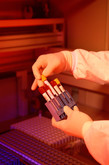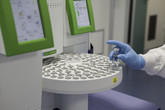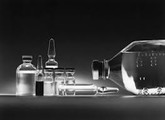Biosimilars/Research
Copy biological approvals in China, compared to the US and EU
A review of copy biological approvals in China finds that 75% of approved monoclonal antibodies, fusion proteins and granulocyte colony-stimulating factor (G-CSF) copy biologicals have been successfully commercialized in the country [1].
Rationale for biosimilar assessment without efficacy trials
An article published in Drug Discovery Today explores the necessity of the clinical efficacy trial in biosimilarity assessments [1].
Shared decision-making and the transition to biosimilars
Increasing healthcare cost are forcing health authorities to look for low-cost innovations to help bend the cost curve. Biosimilars, a biotherapeutic product which is similar in terms of quality, safety and efficacy to an already licensed reference biological, are such an innovation [1]. Because biosimilars are often offered at lower prices, their use has been promoted all across the world. The initiating of biosimilars in bio-naïve patients is already commonplace in many countries. However, the transitioning from originator biological to its biosimilar for non-medical reasons is still debated. Different strategies about how and when to transition are formulated and applied.
Role of efficacy trials in biosimilar assessments questioned
In recent years, the role of the comparative efficacy trial in biosimilar assessments has been brought into question. This is explored in a recent article published by Bielsky and colleagues [1].
Perceptions of biosimilars and switching in Arab rheumatologists
The introduction of biosimilars into the rheumatology field could lead to dramatic cost savings as has been observed in certain European countries. Their implementation and acquisition, however, is not the same across the world. Many rheumatologists have developed a negative perception toward biosimilars and the process of non-medical switching. As important stakeholders, their views and concerns need to be addressed to ensure an effective introduction of these therapeutic agents. Mohammed Omair and colleagues evaluated how Arab rheumatologists perceive biosimilars in view of understanding the manufacturing and approval process during the Arab League Against Rheumatism Conference (ArLAR) [1].
Biosimilar assessments: do we need efficacy trials?
Regulatory guidelines for biosimilar approval have existed in Europe since 2004. These are based on the totality of evidence from comparative studies with reference products and have always required comparative efficacy studies. However, a recent article by Bielsky et al., published in Drug Discovery Today [1], explores the increasingly questioned role of the clinical efficacy trial in biosimilar approval.
Biopharmaceuticals and biosimilars: manufacturing challenges
Biopharmaceuticals include a complex active pharmaceutical ingredient (API). This is manufactured using living systems such as microbial and mammalian cells which makes manufacture a complicated process. A recent paper by Sia et al. published in GaBI Journal [1] has explored current biopharmaceutical processes and the challenges posed by manufacturer.
Biopharmaceuticals and biosimilars: manufacturing processes
The active pharmaceutical ingredient (API) in biopharmaceuticals is manufactured using living systems such as microbial and mammalian cells. Due to this, their manufacture is complex. A recent review by Sia et al. published in GaBI Journal [1] has carried out an in-depth exploration of current biopharmaceutical manufacturing processes.
Pharmacists are key to quality use of medicines for biosimilars
A commissioned review in The Pharmaceutical Journal [1] on interchangeability of biosimilars highlights the pivotal role pharmacists play in the adoption and appropriate use of biosimilars.
Clinical review of biosimilars approved in oncology
As cancer therapeutics constitutes a large proportion of the biologicals market, and patents have begun to expire, biosimilars have an important role in optimizing patient access and reducing costs in the oncology therapeutic area. Authors Ngo and Chen from the City of Hope National Medical Center, Los Angeles, USA, give an overview of the US Food and Drug Administration (FDA)-approved biosimilars in oncology and their impact on the healthcare system in the Annals of Pharmacotherapy [1]. A summary of the main findings from that article follows.
Biopharmaceuticals and biosimilars: challenges in manufacture, regulation and international harmonization of GMP
Biopharmaceuticals are large molecules that are far more complex than traditional, chemical pharmaceuticals. With patent expiry for many originators, biosimilar versions are expected to flood the market in the years to come. However, the active pharmaceutical ingredients (APIs) of all such products are manufactured using living systems which means that their manufacture and characterization is also complex.
Why biosimilar applications fail during regulatory evaluation?
The patent expirations of many blockbuster biologicals have paved the way for development of biosimilars and this has the potential to enhance access to otherwise high-cost biological therapies. Given the complexity of biologicals, the regulatory guidelines for biosimilar approval are meticulous and different from generics. Hence biosimilar developers often face issues during the application evaluation by regulatory authorities. With large number of biosimilars in development stage, it is pertinent for a manufacturer to have a deep understanding of the regulatory approval process. Rathore and colleagues from the Indian Institute of Technology offer insights into the objections raised by the regulatory authorities during evaluation of biosimilar applications for marketing authorization with special emphasis on applications reviewed by the US Food and Drug Administration (FDA) and the European Medicines Agency (EMA).
Spectroscopy remains dominant when investigating biosimilar structures
Biopharmacological studies, including biosimilar studies, require investigation of the higher order structure of proteins. A recent review published in GaBI Journal (GABIJ) [1] has found that, although many analytical methods to determine the higher order structures exist, spectroscopic methods remain the most used.
Phase III trial updates of Samsung Bioepis’ bevacizumab and aflibercept biosimilars
Samsung Bioepis has reported positive results from a phase III trial of its bevacizumab biosimilar, Aybinto. The company is also initiating a phase III trial for its aflibercept biosimilar, SB15.
FDA to investigate PD biomarkers to show biosimilarity
The US Food and Drug Administration (US FDA) is conducting research on critical aspects of the use of pharmacodynamic (PD) biomarkers to demonstrate biosimilarity. A study published in Clinical Pharmacology and Therapeutics, has outlined how the agency hopes to inform their thinking on critical aspects of how these biomarkers can be used to reduce the need for comparative clinical studies [1]. In turn, this can reduce the time and cost of bringing a biosimilar product to market, giving faster access to affordable, safe, and effective treatments.
Biosimilars allow fast access to biological drug therapy in Bavaria, Germany
A new study has shown that patients suffering from rheumatism in Bavaria, Germany, are now likely to be prescribed a biological medicine much faster than five years ago. Results of the study were shared at the AG Pro Biosimilars digital symposium on 14 September 2020.
What oncologists do not understand about biosimilars
The availability of biosimilars may improve access to health care by increasing the number of therapeutic options available at potentially lower costs. However, based on the results of multiple surveys of many healthcare providers (HCPs) conducted in recent years, clinicians appear wary of prescribing biosimilars.
Budget savings from biosimilar infliximab in the UK, France, Japan and Korea
Biological medicines are attracting attention from policymakers and health insurers across countries due to their increased financial burden. The potential for biosimilars’ cost savings can be influenced by various factors, including supply-side (pricing policies) and demand-side (usage-enhancing) policies.
Celltrion’s biosimilars effective against gastric cancer and B-cell lymphoma
Recent clinical trial results confirm that Celltrion’s biosimilars Herzuma (trastuzumab) and Truxima (rituximab) are effective in the treatment of gastric cancer and B-cell lymphoma, respectively.
Monoclonal antibody biosimilars and cancer in the EU
Spanish researchers investigated the current status of biosimilar monoclonal antibodies (mAbs) in the European Union (EU) by reviewing the regulatory pathway, the rationale for extrapolation and switching and the current status and future perspectives of the biosimilars approved in the EU [1].






















